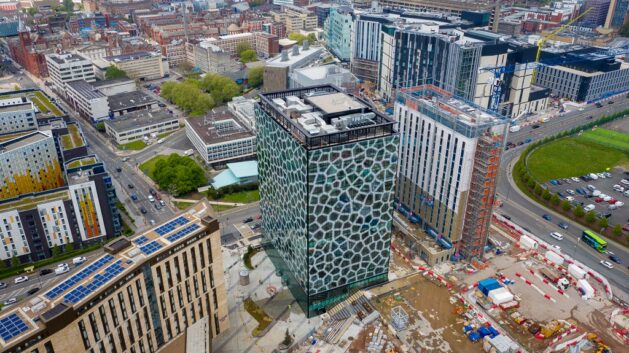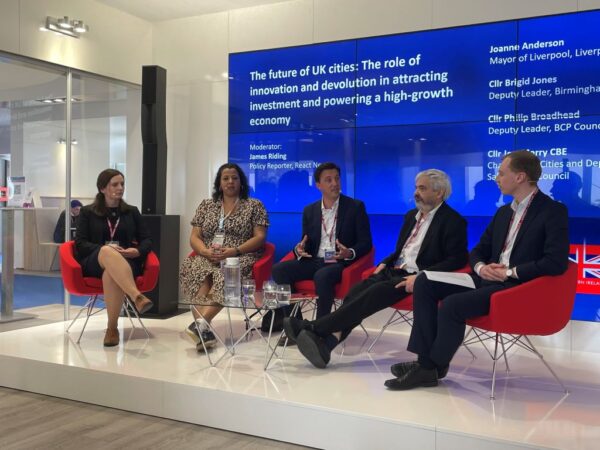MIPIM | Themes from Cannes in 2022
 Good to be back – Having had to wait three years since the last MIPIM, there was an overriding sense of relief at being able to return to some kind of normality. In the lead-up to the event, speculation was all about what Cannes might be like three years on. Murmurings that Caffe Roma, a popular haunt among delegates, was to be closed for refurbishment proved wholly inaccurate, while an equally nasty tale that McDonald’s was no more had also done the rounds, equally untrue. Both were packed for much of the week. Perhaps the biggest rumour that had filtered through the industry was that MIPIM 2022 would be a damp squib. Those who turned up found that too was incorrect. In fact, the success of the week prompted many present to forecast the return of Manchester and other local authorities in 2023.
Good to be back – Having had to wait three years since the last MIPIM, there was an overriding sense of relief at being able to return to some kind of normality. In the lead-up to the event, speculation was all about what Cannes might be like three years on. Murmurings that Caffe Roma, a popular haunt among delegates, was to be closed for refurbishment proved wholly inaccurate, while an equally nasty tale that McDonald’s was no more had also done the rounds, equally untrue. Both were packed for much of the week. Perhaps the biggest rumour that had filtered through the industry was that MIPIM 2022 would be a damp squib. Those who turned up found that too was incorrect. In fact, the success of the week prompted many present to forecast the return of Manchester and other local authorities in 2023.
Covid trouble – Not everyone who had planned to attend actually made it. Covid, while largely under control, is still around and put paid to the hopes of several willing North West delegates – not least Liverpool City Region Mayor Steve Rotheram. The man spearheading the Liverpool delegation was in England when things kicked off in Cannes, but his absence gave three other key figures a larger share of the limelight. Liverpool City Council chief executive, Tony Reeves, and city Mayor, Joanne Anderson, took the opportunity to talk up the city and its new path. It was a much-needed PR boost for Liverpool after a tough few years. The rest of the Liverpool City Region still got a decent airing in Rotheram’s absence, chief executive Katherine Fairclough banging the drum for the wider Liverpool area, especially in terms of how it can contribute towards the government’s net zero goals.

Reeves said Liverpool was well-placed to play a part in the UK’s wellbeing push. Credit: via Liverpool City Council
Health and wellbeing – Wellbeing was a perpetual discussion point throughout the week as companies put forward ideas about how to improve the experience of end-users. Windows that actually open, incorporating oxygen boosting plants and providing access to outdoor space are hardly new ideas but they are good ones. The attention this topic received throughout the week is a direct result of the pandemic and perhaps the biggest positive to have come from the last two years from a real estate perspective. As well as individual developments contributing to wellbeing, cities and places were also talking about how they can drive the issue forward. Liverpool City Council chief executive Tony Reeves said the city was well placed to play its part in dealing with the country’s growing issues surrounding mental health, which he described as “a huge issue post-Covid”.
Tech focus – Tech was more prominent than ever across MIPIM. The main tech area, the Propel Station, might have been in the basement of the Palais, but the line between property and tech is clearly starting to blur. Startups doing everything from tenant engagement apps to mapping software were also dotted in and among local and regional stands – above ground. Discussions around innovation – how to respond to changing office needs, post-pandemic, or how to fix the sector’s massive carbon problem – visibly drew more attention than in years past. But for all the progress in talking about ESG, for example, some answers still felt elusive. If 80% of buildings that will exist in 2050 have already been built, how do we retrofit them all so they don’t waste endless amounts of carbon? If a building is designed to be net zero, can we ensure that it’s actually operationally efficient? What actually is the metaverse – and should property care? MIPIM proved that property is asking more forward-looking questions. Maybe soon we’ll also have the answers.
Power to the people – The word is that the offices of the future will be employee-focused. In order to attract companies back to traditional workspaces, landlords need to target the employees and craft a space that makes them want to go to work. “The chief human resources officer will be the all-powerful figure in real estate,” predicted Tim Oldman, founder and chief executive of employee experience analytics company Leesman, at one MIPIM panel. Fellow panellist Bradley Baker, chief executive of London developer CO-RE, agreed. “Offices need to be more engaging to give staff a reason to come in,” Baker said. “Lots of character with ESG at the heart – that’s what the occupier wants”. Baker went on to say that the focus on ESG is so intense that it has become crucial to mention within the first moments of talking to a potential occupier. “If ESG is not mentioned in the first few minutes, you’ve lost that chief executive.”
Russia and Ukraine – The war in Ukraine often came up in conversation throughout the week. Homes England chief executive Peter Denton was seen ‘dealing with Ukraine’ on the phone outside the UK Pavilion on Tuesday morning and he wasn’t the only one. Many public sector workers who had been planning to attend were needed back home to deal with the refugee crisis. MIPIM attendees heard how Russia’s invasion of Ukraine was driving the cost of resources up and putting even more strain on development. The consensus was that those who act quickly to mitigate will be able to ride the wave better than others. Andrew Coombs, managing director of Sirius Real Estate, said soaring fuel prices could present an opportunity for larger landlords and investors who can pick up assets from owners with smaller portfolios that are more seriously affected by fuel price increases. A consolidation of industrial stock to a smaller pool of owners could be one consequence.
Collaboration and UK plc – There were fewer local authorities at MIPIM 2022 than in previous years but this gave the UK a less fractious platform to talk up the nation as a whole, with a particular focus on levelling up. The UK pavilion was regularly packed out, with Homes England making itself heard and panels made up of representatives from across the country talking up their areas through the lens of nationwide collaboration. The key theme was regeneration. Gone are the days when Homes England was merely there to boost housing numbers – now it is aiming to play a key role in placemaking, adopting a more holistic approach to divvying up cash and taking a more proactive approach to engaging with councils. The organisation sent out a clear message to its public sector partners: get your ducks in a row and we will be there to support. Those without clear strategies and demonstrable pipelines beware.
University partnerships – It felt like you could not escape a panel without a mention of innovation districts, life science parks and knowledge quarters. Tony Reeves and Katherine Fairclough played up Liverpool and the city region’s partnerships with universities – a key part of what Reeves called the “triple helix”. Newcastle Gateshead Initiative’s Sarah Green and North of Tyne Combined Authority’s Chrisi Page made similar points, boasting about their area’s tech business potential. If these local authorities have their way, the Golden Triangle will be yesterday’s news.
Gove us confidence – It is not just Homes England that is talking a good game. After an impressive start to his tenure, there is hope that the head of the Department for Levelling Up, Housing, and Communities is genuinely serious about the agenda. In the space of one panel, Cllr John Merry, deputy leader of Salford City Council, twice expressed his confidence in Michael Gove’s ability to get things done and suggested we may see some tangible results of levelling up soon. He was one of many to express this sentiment but like others at the event, Merry was less confident in the willingness of the treasury to stump up the cash needed to deliver real change. There was a pervading sense that we would still be discussing what levelling up might actually look like once MIPIM rolls around again in 12 months’ time.
Place North West MIPIM 2022 coverage is sponsored by Castle Green Homes






